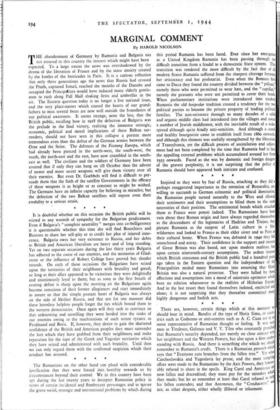Inipired as they were by fear of Russia, attaching as
they did a perhaps exaggerated importance to the retention of Bessarabia, un- willing to succumb to German economic and political domination, the Rumanian people turned naturally to the West and allowed their sentiments and their assumptions to blind them to the stark necessities of their position. The sentimental bonds which attached them to France were potent indeed. The Rumanians have been vain about their Roman origin and have always regarded themselves as the descendants of the legionaries of Hadrian and Trajan; they picture Rumania as the outpost of Latin culture in a Slav wilderness and looked to France as their elder sister and to Paris as their cultural home. When France was, defeated in 1940 they felt unanchored and astray. Their confidence in the support and interest of Great Britain was also based, not upon modern realities, but upon certain nineteenth-century assumptions. The ardent interest which British statesmen and the British public had a hundred years ago taken in the Eastern question and the independence of the Principalities misled many Rumanians into assuming that Great Britain was also a natural protector. They were lulled by these affections and assumptions into a mood of uncertain optimism which bore no relation whatsoever to the realities of Hitlerian Europe. And in the last resort they found themselves isolated, encircled and alone; it is not surprising that they thereafter committed man! highly dangerous and foolish acts.
* * * *


























 Previous page
Previous page